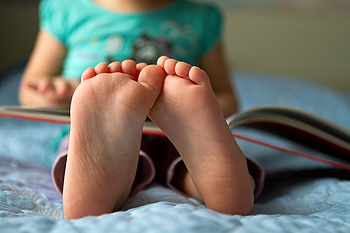Blogs
Exercises for avoiding foot pain
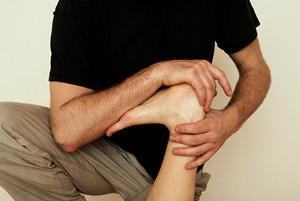 While wearing proper-fitting shoes is a well-known tip for avoiding foot pain, sometimes it may not be enough. If your shoes are comfortable and fit properly to your feet and you’re still experiencing pain, trying certain foot exercises and stretches may help. Rolling a tennis ball underneath the toes is a great way to massage the entire foot. Using your hands and fingers to stretch between the toes can also give relief. Other exercises include repeating heel and toe raises as well as toegrips, or picking up a pencil using only one foot.
While wearing proper-fitting shoes is a well-known tip for avoiding foot pain, sometimes it may not be enough. If your shoes are comfortable and fit properly to your feet and you’re still experiencing pain, trying certain foot exercises and stretches may help. Rolling a tennis ball underneath the toes is a great way to massage the entire foot. Using your hands and fingers to stretch between the toes can also give relief. Other exercises include repeating heel and toe raises as well as toegrips, or picking up a pencil using only one foot.
Exercising your feet regularly with the proper foot wear is a great way to prevent injuries and build strength. If you have any concerns about your feet, contact Dr. Dean D. Hinners from Illinois. Our doctor can provide the care you need to keep you pain-free and on your feet.
Exercise for Your Feet
Exercise for your feet can help you gain strength, mobility and flexibility in your feet. They say that strengthening your feet can be just as rewarding as strengthening another part of the body. Your feet are very important, and we often forget about them in our daily tasks. But it is because of our feet that are we able to get going and do what we need to. For those of us fortunate enough to not have any foot problems, it is an important gesture to take care of them to ensure good health in the long run.
Some foot health exercises can include ankle pumps, tip-toeing, toe rises, lifting off the floor doing reps and sets, and flexing the toes. It is best to speak with Our doctor to determine an appropriate regimen for your needs. Everyone’s needs and bodies are different, and the activities required to maintain strength in the feet vary from individual to individual.
Once you get into a routine of doing regular exercise, you may notice a difference in your feet and how strong they may become.
If you have any questions please feel free to contact one of our offices located in Metropolis and Eldorado, IL . We offer the newest diagnostic and treatment technologies for all your foot and ankle needs.
Finding the Perfect Shoe for You
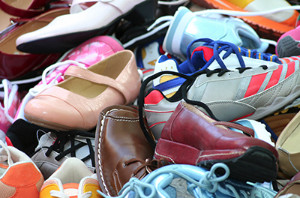 It is crucial for people of all ages to have properly fitting shoes. You should always try on shoes while in the shoestore in order to make sure you are getting the right fit. A new pair of shoes should never pinch your feet, and there should be at least one finger length of space at the top of the shoe. Additionally, your heel should have a firm positioning inside of the shoe. It is advised that the shoe buyer takes a walk around in the store for several minutes before making a purchase, in order to know if the shoes fit properly.
It is crucial for people of all ages to have properly fitting shoes. You should always try on shoes while in the shoestore in order to make sure you are getting the right fit. A new pair of shoes should never pinch your feet, and there should be at least one finger length of space at the top of the shoe. Additionally, your heel should have a firm positioning inside of the shoe. It is advised that the shoe buyer takes a walk around in the store for several minutes before making a purchase, in order to know if the shoes fit properly.
Finding a properly-fitting shoe is important in reducing injuries and preventing foot problems. For more information about treatment, contact Dr. Dean D. Hinners from Illinois. Our doctor will treat your foot and ankle needs.
Proper Shoe Fitting
A common concern when it comes to foot health, having properly fitted shoes can help prevent injuries to the foot. Out feet affect our posture and gait, which in turn affects the biomechanics and overall bodily structure. With 33 joints, 26 bones, and over 100 ligaments, the potential for serious injury is much greater than one realizes. Although the feet cease growth in adulthood, they still change shape as they mature. Here are some factors to consider when it comes to investing in proper fitting shoes:
- Be sure the shoes fit correctly right away
- Ensure the ball of your foot fits comfortably in the widest portion of the shoes
- Even though they may look fashionable, improper fitting shoes can either create adverse conditions or exacerbate existing ones you may already have
- Walk along a carpeted surface to ensure the shoes comfortably fit during normal activity
Keeping in mind how shoes fit the biomechanics of your body, properly-fitting shoes are vitally important. Fortunately, it is not difficult to acquire footwear that fits correctly. Be sure to wear shoes that support the overall structure of your body. Do your feet a favor and invest in several pairs of well-fitted shoes today.
If you have any questions please feel free to contact one of our offices located in Metropolis and Eldorado, IL . We offer the newest diagnostic and treatment technologies for all your foot and ankle needs.
Different Types of Corns
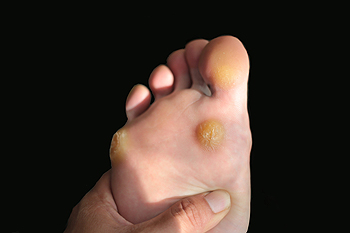 If you have a hard, thickened area of skin on the foot you may possibly have a corn. This condition comes from rubbing, which puts pressure on the skin. Corns form on the feet, which may make walking difficult and painful. There are a few different types of corns, one being soft which typically develops between the toes. Another type is a hard corn, which is a small patch of thickened skin with a portion of softer skin in the center. There are also seed corns that consist of a group of smaller corns, and tend to occur on the bottom of the feet. Ill-fitting shoes are the most common causes of this foot disorder. Women are more likely to develop corns because of frequent wearing of high heels. These shoes put pressure on the toes which can lead to thickening of skin on the foot. Wearing shoes without socks may be another cause of corns, which can lead to friction
If you have a hard, thickened area of skin on the foot you may possibly have a corn. This condition comes from rubbing, which puts pressure on the skin. Corns form on the feet, which may make walking difficult and painful. There are a few different types of corns, one being soft which typically develops between the toes. Another type is a hard corn, which is a small patch of thickened skin with a portion of softer skin in the center. There are also seed corns that consist of a group of smaller corns, and tend to occur on the bottom of the feet. Ill-fitting shoes are the most common causes of this foot disorder. Women are more likely to develop corns because of frequent wearing of high heels. These shoes put pressure on the toes which can lead to thickening of skin on the foot. Wearing shoes without socks may be another cause of corns, which can lead to friction
If you have any concerns regarding your feet and ankles, contact Dr. Dean D. Hinners of Illinois. Our doctor will treat your foot and ankle needs.
Corns: What Are They? and How Do You Get Rid of Them?
Corns can be described as areas of the skin that have thickened to the point of becoming painful or irritating. They are often layers and layers of the skin that have become dry and rough, and are normally smaller than calluses.
Ways to Prevent Corns
There are many ways to get rid of painful corns such as wearing:
- Well-fitting socks
- Comfortable shoes that are not tight around your foot
- Shoes that offer support
Treating Corns
Treatment of corns involves removing the dead skin that has built up in the specific area of the foot. Consult with Our doctor to determine the best treatment option for your case of corns.
If you have any questions please feel free to contact one of our offices located in Metropolis and Eldorado, IL . We offer the newest diagnostic and treatment technologies for all your foot and ankle needs.
Does My Baby Have an Ingrown Toenail?
When a toe is affected by the nail pressing into the skin, this condition is referred to as an ingrown toenail. This condition affects not only grown adults, but children and babies as well. Your baby may cry when the big toe rubs against a shoe or sock, and the tender skin will often be painful. A blister may emerge, and if an infection occurs, the discharge will be yellowish in color if it breaks. To prevent this condition, it’s recommended to use a nail clipper instead of scissors, which allows the nail to be cut straight across. Babies' feet typically grow fast, so it’s crucial to check the fit of the shoes and socks often. A consultation with a podiatrist may be advised for treatment options, which may include administering an antibiotic and possibly trimming the nail away from the skin.
Ingrown toenails can become painful if they are not treated properly. For more information about ingrown toenails, contact Dr. Dean D. Hinners of Illinois. Our doctor can provide the care you need to keep you pain-free and on your feet.
Ingrown Toenails
Ingrown toenails occur when a toenail grows sideways into the bed of the nail, causing pain, swelling, and possibly infection.
Causes
- Bacterial infections
- Improper nail cutting such as cutting it too short or not straight across
- Trauma to the toe, such as stubbing, which causes the nail to grow back irregularly
- Ill-fitting shoes that bunch the toes too close together
- Genetic predisposition
Prevention
Because ingrown toenails are not something found outside of shoe-wearing cultures, going barefoot as often as possible will decrease the likeliness of developing ingrown toenails. Wearing proper fitting shoes and using proper cutting techniques will also help decrease your risk of developing ingrown toenails.
Treatment
Ingrown toenails are a very treatable foot condition. In minor cases, soaking the affected area in salt or antibacterial soaps will not only help with the ingrown nail itself, but also help prevent any infections from occurring. In more severe cases, surgery is an option. In either case, speaking to your podiatrist about this condition will help you get a better understanding of specific treatment options that are right for you.
If you have any questions please feel free to contact one of our offices located in Metropolis and Eldorado, IL . We offer the newest diagnostic and treatment technologies for all your foot and ankle needs.
Can Being Obese Affect My Feet?
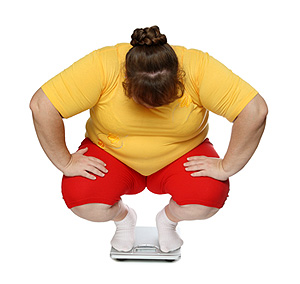 Obesity is a worldwide issue, affecting people from many different countries, and is often seen as a gateway for serious health conditions. The extra weight may cause imbalanced walking, consequently putting people at risk for falls and ankle sprains or breaks. Some people experience swollen feet, often being a sign of circulatory problems, in addition to developing cracked heels, originating from additional pressure on the feet. Practicing proper foot hygiene is crucial for preventing many different kinds of foot disorders. Drying the skin between the toes is important, as this habit may prevent fungal infections from developing. Additionally, because some feet may be wider than average, it is critical to wear a well-fitted shoe. If you are experiencing health issues in your feet, a consultation with a podiatrist is advised for a diagnosis and treatment options.
Obesity is a worldwide issue, affecting people from many different countries, and is often seen as a gateway for serious health conditions. The extra weight may cause imbalanced walking, consequently putting people at risk for falls and ankle sprains or breaks. Some people experience swollen feet, often being a sign of circulatory problems, in addition to developing cracked heels, originating from additional pressure on the feet. Practicing proper foot hygiene is crucial for preventing many different kinds of foot disorders. Drying the skin between the toes is important, as this habit may prevent fungal infections from developing. Additionally, because some feet may be wider than average, it is critical to wear a well-fitted shoe. If you are experiencing health issues in your feet, a consultation with a podiatrist is advised for a diagnosis and treatment options.
Obesity has become very problematic at this point in time and can have extremely negative effects on the feet. If you’re an obese individual and are concerned about your feet, contact Dr. Dean D. Hinners from Illinois. Our doctor can provide the care you need to keep you pain-free and on your feet.
Obesity and Your Feet
Since your feet are what support your entire weight when standing, any additional weight can result in pain and swelling. Being overweight is one of the main contributors to foot complications.
Problems & Complications
Extra Weight – Even putting on just a few extra pounds could create serious complications for your feet. As your weight increases, your balance and body will shift, creating new stresses on your feet. This uneven weight distribution can cause pain, even while doing the simplest tasks, such as walking.
Diabetes – People who are overweight are at serious risk of developing type-2 diabetes, which has a drastic impact on the health of your feet. As you get older, your diabetes might worsen, which could lead to loss of feeling in your feet, sores, and bruises. You could also become more prone to various infections.
Plantar fasciitis – Pressure and stress that is placed on muscles, joints, and tendons can trigger plantar fasciitis, which is an inflammation of tissue that forms along the bottom of the foot.
If you have any questions please feel free to contact one of our offices located in Metropolis and Eldorado, IL . We offer the newest diagnostic and treatment technologies for all your foot and ankle needs.
The Importance of Properly Caring for Elder’s Feet
 Elderly people may develop conditions concerning the feet as they age. There are several reasons why this may occur, including a loss of natural cushioning the foot possesses, poor circulation, and brittle nails. Some of these ailments may include athlete’s foot, dry skin, which may cause cracked heels, or additional uncomfortable conditions known as heel spurs and hammertoes. Research has shown that an important part of maintaining healthy feet is to choose shoes and socks that fit comfortably. It’s common for feet to get wider as we age, which makes it beneficial to have the feet routinely measured. It’s crucial for diabetic seniors to practice proper foot care, and this may possibly prevent wounds and cuts from becoming worse, which may be a result of a loss of sensation in the feet. If you would like additional information about how to care for elderly people’s feet, please consult with a podiatrist.
Elderly people may develop conditions concerning the feet as they age. There are several reasons why this may occur, including a loss of natural cushioning the foot possesses, poor circulation, and brittle nails. Some of these ailments may include athlete’s foot, dry skin, which may cause cracked heels, or additional uncomfortable conditions known as heel spurs and hammertoes. Research has shown that an important part of maintaining healthy feet is to choose shoes and socks that fit comfortably. It’s common for feet to get wider as we age, which makes it beneficial to have the feet routinely measured. It’s crucial for diabetic seniors to practice proper foot care, and this may possibly prevent wounds and cuts from becoming worse, which may be a result of a loss of sensation in the feet. If you would like additional information about how to care for elderly people’s feet, please consult with a podiatrist.
Proper foot care is something many older adults forget to consider. If you have any concerns about your feet and ankles, contact Dr. Dean D. Hinners from Illinois. Our doctor can provide the care you need to keep you pain-free and on your feet.
The Elderly and Their Feet
As we age we start to notice many changes in our body, but the elder population may not notice them right away. Medical conditions may prevent the elderly to take notice of their foot health right away. Poor vision is a lead contributor to not taking action for the elderly.
Common Conditions
- Neuropathy – can reduce feeling in the feet and can hide many life-threatening medical conditions.
- Reduced flexibility – prevents the ability of proper toenail trimming, and foot cleaning. If left untreated, it may lead to further medical issues.
- Foot sores – amongst the older population can be serious before they are discovered. Some of the problematic conditions they may face are:
- Gouging toenails affecting nearby toe
- Shoes that don’t fit properly
- Pressure sores
- Loss of circulation in legs & feet
- Edema & swelling of feet and ankles
Susceptible Infections
Diabetes and poor circulation can cause general loss of sensitivity over the years, turning a simple cut into a serious issue.
If you have any questions please feel free to contact one of our offices located in Metropolis and Eldorado, IL . We offer the newest diagnostic and treatment technologies for all your foot and ankle needs.
Foot Conditions Resulting from Aging Feet
 Research has shown that the feet of elderly people may develop foot conditions as the aging process occurs. This may be a result of a loss of cushioning that is found in the feet, in addition to changes in the toenails and skin. It’s important to wear shoes that are comfortable and fit properly, which may include eliminating high heels or shoes that have inadequate room for the toes to move about in. Circulation may improve when gentle foot stretches are performed throughout the day, in addition to wearing socks that are not too tight. There are several common ailments that may be prevalent to aging feet, including Athlete’s foot, cracked heels, and the formation of corns and calluses. Many seniors may become afflicted with the uncomfortable condition known as ingrown toenails, which may be a result of the toenails being cut improperly. Please consult with a podiatrist about effective techniques to properly care for elderly feet.
Research has shown that the feet of elderly people may develop foot conditions as the aging process occurs. This may be a result of a loss of cushioning that is found in the feet, in addition to changes in the toenails and skin. It’s important to wear shoes that are comfortable and fit properly, which may include eliminating high heels or shoes that have inadequate room for the toes to move about in. Circulation may improve when gentle foot stretches are performed throughout the day, in addition to wearing socks that are not too tight. There are several common ailments that may be prevalent to aging feet, including Athlete’s foot, cracked heels, and the formation of corns and calluses. Many seniors may become afflicted with the uncomfortable condition known as ingrown toenails, which may be a result of the toenails being cut improperly. Please consult with a podiatrist about effective techniques to properly care for elderly feet.
Proper foot care is something many older adults forget to consider. If you have any concerns about your feet and ankles, contact Dr. Dean D. Hinners from Illinois. Our doctor can provide the care you need to keep you pain-free and on your feet.
The Elderly and Their Feet
As we age we start to notice many changes in our body, but the elder population may not notice them right away. Medical conditions may prevent the elderly to take notice of their foot health right away. Poor vision is a lead contributor to not taking action for the elderly.
Common Conditions
- Neuropathy – can reduce feeling in the feet and can hide many life-threatening medical conditions.
- Reduced flexibility – prevents the ability of proper toenail trimming, and foot cleaning. If left untreated, it may lead to further medical issues.
- Foot sores – amongst the older population can be serious before they are discovered. Some of the problematic conditions they may face are:
- Gouging toenails affecting nearby toe
- Shoes that don’t fit properly
- Pressure sores
- Loss of circulation in legs & feet
- Edema & swelling of feet and ankles
Susceptible Infections
Diabetes and poor circulation can cause general loss of sensitivity over the years, turning a simple cut into a serious issue.
If you have any questions please feel free to contact one of our offices located in Metropolis and Eldorado, IL . We offer the newest diagnostic and treatment technologies for all your foot and ankle needs.
Possible Loss of Cushioning in Elderly Feet
 Research has shown the aging process may cause toenails to gradually become brittle, and the feet may lose cushioning. Additionally, seniors may experience circulation issues, which may cause existing wounds to heal slower. It is beneficial to walk frequently throughout the day and perform gentle stretching exercises that can help to improve circulation. It’s important for elderly people to wear shoes that fit correctly, assuring there is ample room for the toes to move freely in. This may be helpful in preventing painful foot conditions from developing, including bunions, hammertoes, and ingrown toenails. The feet will generally feel better when a moisturizer is applied daily, and appropriate shoes are worn in warm and moist environments. These practices may be helpful in preventing cracked heels and athlete’s foot. If you would like additional information about how to care for elderly feet, it is suggested that you consult with a podiatrist.
Research has shown the aging process may cause toenails to gradually become brittle, and the feet may lose cushioning. Additionally, seniors may experience circulation issues, which may cause existing wounds to heal slower. It is beneficial to walk frequently throughout the day and perform gentle stretching exercises that can help to improve circulation. It’s important for elderly people to wear shoes that fit correctly, assuring there is ample room for the toes to move freely in. This may be helpful in preventing painful foot conditions from developing, including bunions, hammertoes, and ingrown toenails. The feet will generally feel better when a moisturizer is applied daily, and appropriate shoes are worn in warm and moist environments. These practices may be helpful in preventing cracked heels and athlete’s foot. If you would like additional information about how to care for elderly feet, it is suggested that you consult with a podiatrist.
Proper foot care is something many older adults forget to consider. If you have any concerns about your feet and ankles, contact Dr. Dean D. Hinners from Illinois. Our doctor can provide the care you need to keep you pain-free and on your feet.
The Elderly and Their Feet
As we age we start to notice many changes in our body, but the elder population may not notice them right away. Medical conditions may prevent the elderly to take notice of their foot health right away. Poor vision is a lead contributor to not taking action for the elderly.
Common Conditions
- Neuropathy – can reduce feeling in the feet and can hide many life-threatening medical conditions.
- Reduced flexibility – prevents the ability of proper toenail trimming, and foot cleaning. If left untreated, it may lead to further medical issues.
- Foot sores – amongst the older population can be serious before they are discovered. Some of the problematic conditions they may face are:
- Gouging toenails affecting nearby toe
- Shoes that don’t fit properly
- Pressure sores
- Loss of circulation in legs & feet
- Edema & swelling of feet and ankles
Susceptible Infections
Diabetes and poor circulation can cause general loss of sensitivity over the years, turning a simple cut into a serious issue.
If you have any questions please feel free to contact one of our offices located in Metropolis and Eldorado, IL . We offer the newest diagnostic and treatment technologies for all your foot and ankle needs.
Water Retention During Pregnancy May Affect The Feet
 Many pregnant women are aware of water retention in the body as the pregnancy progresses. This typically affects the feet, and causes swelling in the lower extremities. This is a result of an increase in hormones, sodium, and potassium levels that occur during pregnancy. It is helpful to elevate the legs as often as possible, and this may bring moderate relief to throbbing feet. Many pregnant women find it beneficial to limit the amount of salt that is ingested, which is important in regulating water retention. Research has indicated it is helpful to drink plenty of water daily, in addition to performing a gentle exercise routine. If you have concerns about how pregnancy can affect the feet, it is suggested you counsel with a podiatrist.
Many pregnant women are aware of water retention in the body as the pregnancy progresses. This typically affects the feet, and causes swelling in the lower extremities. This is a result of an increase in hormones, sodium, and potassium levels that occur during pregnancy. It is helpful to elevate the legs as often as possible, and this may bring moderate relief to throbbing feet. Many pregnant women find it beneficial to limit the amount of salt that is ingested, which is important in regulating water retention. Research has indicated it is helpful to drink plenty of water daily, in addition to performing a gentle exercise routine. If you have concerns about how pregnancy can affect the feet, it is suggested you counsel with a podiatrist.
Pregnant women with swollen feet can be treated with a variety of different methods that are readily available. For more information about other cures for swollen feet during pregnancy, consult with Dr. Dean D. Hinners from Illinois. Our doctor will attend to all of your foot and ankle needs.
What Foot Problems Can Arise During Pregnancy?
One problem that can occur is overpronation, which occurs when the arch of the foot flattens and tends to roll inward. This can cause pain and discomfort in your heels while you’re walking or even just standing up, trying to support your baby.
Another problem is edema, or swelling in the extremities. This often affects the feet during pregnancy but tends to occur in the later stages.
How Can I Keep My Feet Healthy During Pregnancy?
- Wearing orthotics can provide extra support for the feet and help distribute weight evenly
- Minimize the amount of time spent walking barefoot
- Wear shoes with good arch support
- Wear shoes that allow for good circulation to the feet
- Elevate feet if you experience swelling
- Massage your feet
- Get regular, light exercise, such as walking, to promote blood circulation to the feet
If you have any questions please feel free to contact one of our offices located in Metropolis and Eldorado, IL . We offer the newest diagnostic and treatment technologies for all your foot and ankle needs.
Foot Conditions Caused by High Heels
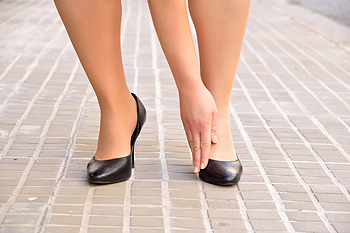 There are many women who enjoy wearing high heels, but they may not be aware of the potential foot conditions that they can cause. Painful foot ailments may be prevented when certain measures are implemented. These can include choosing shoes that fit perfectly, which can provide an adequate amount of ankle support. Additionally, some women find it helpful to stretch the shoe slightly by wearing socks, as this may help to provide a good fit. It can be beneficial to wear different types of high heels, and a smaller heel may help alleviate aching feet. Blisters can be a common ailment as a result of wearing high heels, and it may help to wear a bandage over problem areas. If you would like additional information about the effect high heels may have on your feet, please confer with a podiatrist.
There are many women who enjoy wearing high heels, but they may not be aware of the potential foot conditions that they can cause. Painful foot ailments may be prevented when certain measures are implemented. These can include choosing shoes that fit perfectly, which can provide an adequate amount of ankle support. Additionally, some women find it helpful to stretch the shoe slightly by wearing socks, as this may help to provide a good fit. It can be beneficial to wear different types of high heels, and a smaller heel may help alleviate aching feet. Blisters can be a common ailment as a result of wearing high heels, and it may help to wear a bandage over problem areas. If you would like additional information about the effect high heels may have on your feet, please confer with a podiatrist.
High heels have a history of causing foot and ankle problems. If you have any concerns about your feet or ankles, contact Dr. Dean D. Hinners from Illinois. Our doctor can provide the care you need to keep you pain-free and on your feet.
Effects of High Heels on the Feet
High heels are popular shoes among women because of their many styles and societal appeal. Despite this, high heels can still cause many health problems if worn too frequently.
Which Parts of My Body Will Be Affected by High Heels?
- Ankle Joints
- Achilles Tendon – May shorten and stiffen with prolonged wear
- Balls of the Feet
- Knees – Heels cause the knees to bend constantly, creating stress on them
- Back – They decrease the spine’s ability to absorb shock, which may lead to back pain. The vertebrae of the lower back may compress.
What Kinds of Foot Problems Can Develop from Wearing High Heels?
- Corns
- Calluses
- Hammertoe
- Bunions
- Morton’s Neuroma
- Plantar Fasciitis
How Can I Still Wear High Heels and Maintain Foot Health?
If you want to wear high heeled shoes, make sure that you are not wearing them every day, as this will help prevent long term physical problems. Try wearing thicker heels as opposed to stilettos to distribute weight more evenly across the feet. Always make sure you are wearing the proper shoes for the right occasion, such as sneakers for exercising. If you walk to work, try carrying your heels with you and changing into them once you arrive at work. Adding inserts to your heels can help cushion your feet and absorb shock. Full foot inserts or metatarsal pads are available.
If you have any questions please feel free to contact one of our offices located in Metropolis and Eldorado, IL . We offer the newest diagnostic and treatment technologies for all your foot and ankle needs.
More...
Are You Suffering From Ingrown Toenails?
Pesky, Persistent Toenail Fungal Infections
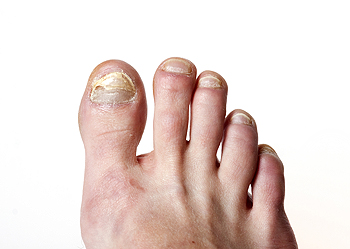
Onychomycosis is the medical term for toenail fungus. While different organisms may be responsible for the infection, dermatophytes are the most common culprits by far. Toenail fungus is a bothersome condition that causes the nails to become discolored, thickened, distorted, ragged, crumbly, brittle, and even smelly in certain cases. Older adults are more prone to contracting a toenail infection because as we age, our nails become more brittle. Brittle nails can crack, which can make it easier for the fungal organism to creep inside the nail and infect it. If you detect any of the symptoms mentioned here, it is advised to seek the care of a podiatrist. Toenail infections can be very difficult to treat at home, given that the organism can burrow deep into the multiple layers of the nail or underneath the nail, making it difficult to target and kill effectively and permanently. Also, home treatment may be risky for people with weakened immune symptoms, diabetes, or circulatory issues.
For more information about treatment, contact Dr. Dean D. Hinners of Illinois. Our doctor can provide the care you need to keep you pain-free and on your feet.
Toenail Fungus Treatment
Toenail fungus is a condition that affects many people and can be especially hard to get rid of. Fortunately, there are several methods to go about treating and avoiding it.
Antifungals & Deterrence
Oral antifungal medicine has been shown to be effective in many cases. It is important to consult with a podiatrist to determine the proper regiment for you, or potentially explore other options.
Applying foot powder on the feet and shoes helps keep the feet free of moisture and sweat.
Sandals or open toed shoes – Wearing these will allow air movement and help keep feet dry. They also expose your feet to light, which fungus cannot tolerate. Socks with moisture wicking material also help as well.
If you have any questions please feel free to contact one of our offices located in Metropolis and Eldorado, IL . We offer the newest diagnostic tools and technology to treat your foot and ankle needs.
Common Ways to Deal With Foot Pain
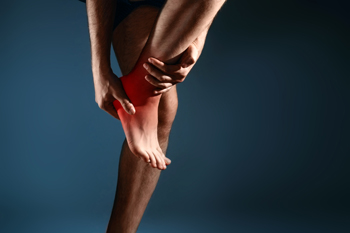
There are many and varied causes of foot pain, including injury, overuse, or conditions that result in inflammation involving bones, ligaments, and tendons. Arthritis and neuropathy are also common causes of foot pain, as are deformities like bunions and hammertoe. A number of methods are available to combat foot pain. A warm foot bath containing Epsom salt can be soothing to sore muscles after a long day of walking or standing. But if your feet are hot, swollen, and tired, a cool foot bath may be more effective. A simple foot massage with essential oils can also help reduce pain and promote flexibility. Exercise also has been shown to counteract muscle tightness. Of course, footwear is often one of the problems frequently associated with foot pain. Make sure that your shoes fit properly, providing ample toe room and adequate cushioning. Have corns and calluses that cause you to change walking patterns looked at and removed. If you have flat feet, or other foot deformities, custom orthotics may help alleviate pain. For more information on why you have foot pain and what to do about it, please consult a podiatrist.
Foot Pain
Foot pain can be extremely painful and debilitating. If you have a foot pain, consult with Dr. Dean D. Hinners from Illinois. Our doctor will assess your condition and provide you with quality foot and ankle treatment.
Causes
Foot pain is a very broad condition that could be caused by one or more ailments. The most common include:
- Bunions
- Hammertoes
- Plantar Fasciitis
- Bone Spurs
- Corns
- Tarsal Tunnel Syndrome
- Ingrown Toenails
- Arthritis (such as Gout, Rheumatoid, and Osteoarthritis)
- Flat Feet
- Injury (from stress fractures, broken toe, foot, ankle, Achilles tendon ruptures, and sprains)
- And more
Diagnosis
To figure out the cause of foot pain, podiatrists utilize several different methods. This can range from simple visual inspections and sensation tests to X-rays and MRI scans. Prior medical history, family medical history, and any recent physical traumatic events will all be taken into consideration for a proper diagnosis.
Treatment
Treatment depends upon the cause of the foot pain. Whether it is resting, staying off the foot, or having surgery; podiatrists have a number of treatment options available for foot pain.
If you have any questions, please feel free to contact one of our offices located in Metropolis and Eldorado, IL . We offer the newest diagnostic and treatment technologies for all your foot care needs.
Four Categories of Broken Toes
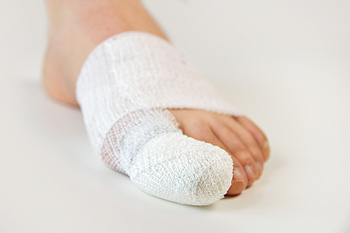
The bones in the toes are known as phalanges, and the big toe consists of two phalanges. There are four types of broken toes that can occur, compressed, comminuted, displaced and non-displaced. In a comminuted fracture, the bone can break into several fragments. When force presses the ends of the bones towards the center, a compressed fracture has occurred. A bone that is moved out of its normal position is indicative of a displaced fracture, while a broken bone that stays in position is called a non-displaced fracture. The most common toe to break is the pinky toe, and this is often done by jamming it into a piece of furniture, or if something heavy drops on it. If the break is mild, buddy taping may be an effective way to promote stability to the toe as the healing process begins. This is done by taping the affected toe to the toe next to it, which may help keep it straight. If you suspect you have broken your toe, a podiatrist can provide an X-ray that can determine the extent of the fracture, and offer you correct treatment options.
A broken toe can be very painful and lead to complications if not properly fixed. If you have any concerns about your feet, contact Dr. Dean D. Hinners from Illinois. Our doctor will treat your foot and ankle needs.
What to Know About a Broken Toe
Although most people try to avoid foot trauma such as banging, stubbing, or dropping heavy objects on their feet, the unfortunate fact is that it is a common occurrence. Given the fact that toes are positioned in front of the feet, they typically sustain the brunt of such trauma. When trauma occurs to a toe, the result can be a painful break (fracture).
Symptoms of a Broken Toe
- Throbbing pain
- Swelling
- Bruising on the skin and toenail
- The inability to move the toe
- Toe appears crooked or disfigured
- Tingling or numbness in the toe
Generally, it is best to stay off of the injured toe with the affected foot elevated.
Severe toe fractures may be treated with a splint, cast, and in some cases, minor surgery. Due to its position and the pressure it endures with daily activity, future complications can occur if the big toe is not properly treated.
If you have any questions please feel free to contact one of our offices located in Metropolis and Eldorado, IL . We offer the newest diagnostic and treatment technologies for all your foot and ankle needs.
